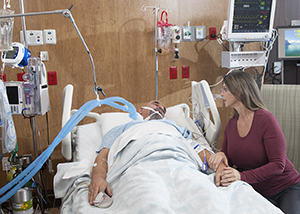When you visit the ICU, it helps to know what to expect. Because space is limited, you may not be able to bring certain things into the ICU. Check with the staff ahead of time. Each ICU has its own rules and visiting hours. But most will follow some of the basic guidelines listed below.
ICU guidelines
People who are ill and children under a certain age should not visit the ICU. To keep from tiring your loved one, limit visitors to two at a time and try to keep visits short. To prevent the spread of infection, wash your hands when entering and leaving the person's room. You may also be asked to put on a gown, mask, or gloves. And it’s best if you don’t wear any perfume. If you hear others speaking to medical staff, please respect their privacy.
What to bring
Cards or small gifts may make your loved one feel better.. Bring a copy of your loved one's medical history, a list of medicines, and any advance medical directive, such as a living will. Be sure the ICU staff has contact information for close family members at all times.
What not to bring
Check with the hospital to see what restrictions are in place. No latex balloons, plants, or flowers, please. Space needs to be kept clear for caregivers and equipment. Turn off cell phones and other electronic devices. And ask the nurse before bringing in electronic equipment. Don’t give your loved one any food or drink (even water) unless you ask the nurse. And don’t share your loved one's meal or bring food into the ICU. Take any valuables, such as jewelry, home for safekeeping.


